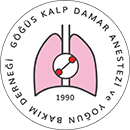

The Effect of Cerebral Oxygen (rSO2) Exchange on Post-Operative Cognitive Dysfunction in Patients Undergoing Ascending Aortic Surgery
Pınar Yıldırım Özkan1, Atakan Erkılınç2, Mustafa Emre Gürcü2, Nur Ürküt Baz31Department of Anesthesiology and Intensive Care, University of Health Sciences, Ümraniye Training and Research Hospital, İstanbul, Türkiye2Department of Anesthesiology and Intensive Care, Istanbul Provincial Directorate of Health Koşuyolu Higher Specialized Training and Research Hospital, İstanbul, Türkiye
3Department of Anesthesiology and Intensive Care, Sultanbeyli Public Hospital, Istanbul, Türkiye
Objectives: The aim of the study was to investigate the effect of cerebral oxygen (rSO2) change on post-operative cognitive dysfunction in patients who underwent ascending aortic aneurysm surgery with antigrade cerebral perfusion.
Methods: Twenty-nine patients, aged between 18 and 75 years, under-going ascending aortic surgery and at least primary school graduates, were included in the study. All patients underwent continuous cerebral oximetry follow-up with NIRS before induction and throughout the operation. Decreases of 20% or more in rSO2 value in NIRS follow-up were considered significant. Neurocognitive evaluation tests were performed 3 times, 1 day before the operation, and on the 1st and 7th days of the operation. For this purpose, mini mental test, clock drawing test, and visual spatial function test were used.
Results: A significant decrease was found between pre-operative rSO2 values and rSO2 values during cardiopulmonary bypass and antigrade cerebral perfusion. However, when this decrease and neurocognitive test results were compared with the Spearman correlation test, no significant correlation was found.
Conclusion: Although there was a 30% decrease in rSO2 compared to the initial value in NIRS follow-ups, especially in the cardiopulmonary bypass and antirgrade cerebral perfusion periods, no significant correlation was detected with post-operative cognitive dysfunction tests. These results suggest that NIRS monitoring allows timely and rapid intervention to decreases in rSO2 values (increasing antigrade cerebral perfusion flow), thus it is beneficial in maintaining optimal cerebral blood flow and can be used as an effective neuromonitorization method to prevent the development of post-operative cognitive dysfunction.
Asendan Aort Cerrahisi Uygulanan Hastalarda Bölgesel Serebral Oksijen Satürasyonu (rSO2) Değişiminin Postoperatif Kognitif Disfonksiyon Üzerine Etkisi
Pınar Yıldırım Özkan1, Atakan Erkılınç2, Mustafa Emre Gürcü2, Nur Ürküt Baz31Sağlık Bilimleri Üniversitesi Ümraniye Eğitim ve Araştırma Hastanesi, Anesteziyoloji ve Reanimasyon Anabilim Dalı, İstanbul, Türkiye2T. C. Sağlık Bakanlığı Kartal Koşuyolu Yüksek İhtisas Eğitim ve Araştırma Hastanesi, Anesteziyoloji ve Reanimasyon Anabilim Dalı, İstanbul, Türkiye
3Sultanbeyli Devlet Hastanesi, Anesteziyoloji ve Reanimasyon Kliniği, İstanbul, Türkiye
Amaç: Çalışmanın amacı; antegrad serebral perfüzyon uygulanan asendan aort anevrizma cerrahisi yapılan hastalarda bölgesel serebral oksijen satürasyonu (rSO2) değişiminin postoperatif kognitif disfonksiyon üzerine etkisinin araştırılmasıdır.
Yöntem: Çalışmaya 18-75 yaş arası, asendan aort cerrahisi uygulanacak, en az ilkokul mezunu olan 29 hasta dahil edildi. Tüm hastalara indüksiyon öncesinde ve operasyon süresince near-infrared spektroskopi (NIRS) ile sürekli serebral oksimetri takibi yapıldı. NIRS takibinde rSO2 değerinde %20 ve üzerinde düşüşler anlamlı kabul edildi. Nörokognitif değerlendirme testleri operasyondan bir gün önce, operasyonun birinci ve yedinci günlerinde olmak üzere üç kez yapıldı. Bu amaçla, mini mental test, saat çizim testi ve görsel mekansal işlev testi kullanıldı.
Bulgular: Preoperatif rSO2 değerleri ile kardiyopulmoner baypas ve antegrad serebral perfüzyon sırasındaki rSO2 değerleri arasında anlamlı bir düşüş saptandı. Ancak Spearman korelasyon testi ile bu düşüş ve nörokognitif test sonuçları karşılaştırıldığında anlamlı bir korelasyon saptanmadı.
Sonuç: NIRS takiplerinde özellikle kardiyopulmoner baypas ve antegrad serebral perfüzyon döneminde, başlangıç değerine göre %30luk rSO2 düşüş olmasına rağmen postoperatif kognitif işlev bozukluğu testleri ile anlamlı bir korelasyon saptanmadı. Bu sonuçlar bize NIRS monitörizasyonu sayesinde rSO2 değerlerindeki düşüşlere vaktinde ve hızlı müdahale edilmesine olanak sağladığını (antegrad serebral perfüzyon akımının artırılması) böylece optimal serebral kan akımının korunmasında faydalı olduğunu gösterdi ve postoperatif kognitif işlev bozukluğu gelişiminin önlenmesinde etkin nöromonitörizasyon yöntemi olarak kullanılabileceği sonucuna varıldı.
Manuscript Language: Turkish
(414 downloaded)

















